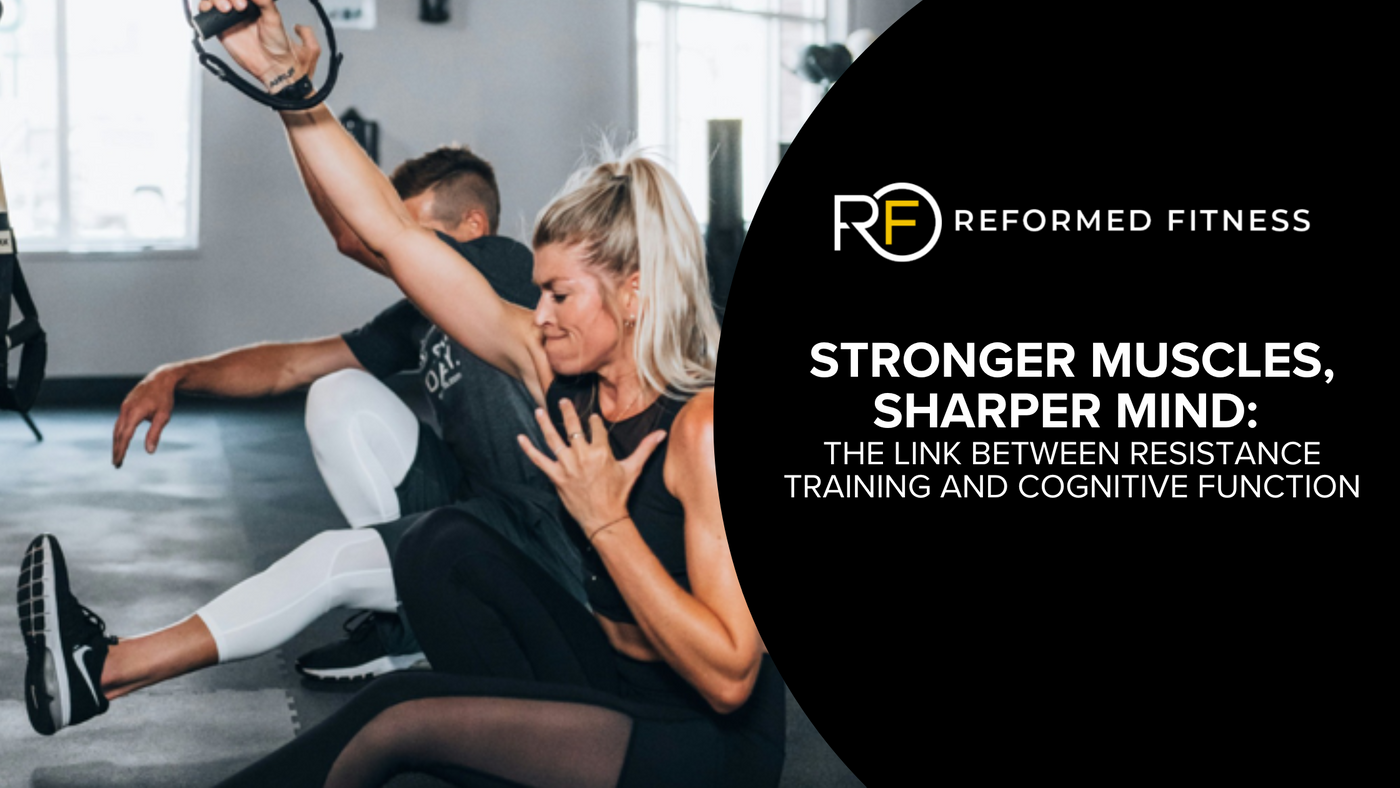A few years ago, a client in her late 40s came to us frustrated not because she was out of shape, but because she couldn’t focus both during her workouts but also in other areas of her life the way she used to.
Work was demanding (isn't it always) but she was performing really well. Her home life was full but the family was together. Some memory lapses, slower reaction times, mental fatigue made it seem exhausting to spend the brain power thinking about workouts and executing a plan
She told us, “I feel like I’m losing my edge.”
She didn’t need a crash diet. She didn’t need more cardio.
She needed a program that trained her body and stimulated her brain in a different way.
Luckily for us the research is very clear on the mental benefits of strength training as it relates to cognitive function, memory, focus, and mental resilience!
How Strength Training Improves Cognitive Function
Resistance training doesn’t just build muscle it reshapes how your brain functions.
In a 2022 meta-analysis published in BMJ Open Sport & Exercise Medicine, researchers reviewed nearly 2,000 studies and found that resistance training significantly improves global cognitive function in adults over 50. These improvements include processing speed, executive function, and attention span.
One key reason for this is the brain-derived neurotrophic factor (BDNF), a protein that helps with neuroplasticity—the brain’s ability to form new connections and adapt over time. Multiple studies have shown that resistance training stimulates the release of BDNF, particularly in older adults, which enhances learning, adaptability, and resilience in cognitive tasks.
Additionally, resistance training has been shown to increase cerebral blood flow and improve insulin sensitivity—both of which support better brain health and reduce the risk of neurodegenerative disease.
Strength Training Enhances Memory
Memory loss isn’t inevitable with aging—and resistance training may be one of the best tools to preserve it.
A landmark study by Liu-Ambrose et al. (2010) published in Archives of Internal Medicine found that older women who performed resistance training twice per week for 12 months showed significant improvements in both verbal and associative memory. The researchers attributed this to increased cortical efficiency and neural activation in regions associated with memory
Another study conducted in 2019 (Chang et al.) using MRI imaging found that 6 months of strength training preserved hippocampal volume, a brain structure essential for long-term memory and learning. In contrast, the control group showed volume loss—highlighting the neuroprotective effects of strength work.
In short, strength training not only slows memory decline—it can actively enhance it by supporting the brain structures that keep memories sharp and accessible.
How Strength Training Builds Mental Strength and Pain Tolerance
Mental resilience is harder to quantify than muscle size, but it’s just as real—and strength training plays a role in building it.
Pain tolerance, emotional regulation, and mental toughness are all influenced by how the nervous system responds to physical stress. Resistance training, especially when performed to momentary muscular failure, creates a unique opportunity for adaptation—not just physically, but psychologically.
A 2014 study in Psychology of Sport and Exercise found that individuals who engaged in consistent resistance training reported higher pain thresholds and reduced perceived exertion in challenging situations. These changes are thought to reflect both neuroendocrine adaptations (e.g., improved cortisol regulation) and increased confidence in one’s physical capabilities.
Moreover, a study published in Frontiers in Psychology (2021) highlighted how regular strength training helps reduce anxiety sensitivity and stress reactivity, leading to greater mental clarity, emotional control, and confidence under pressure.
How to Start (Or Optimize) for Cognitive Health
The good news is, you don’t need to spend hours in the gym to unlock these benefits.
Most studies showing cognitive improvements used 2–3 strength sessions per week, often as short as 30–45 minutes. What matters most is intensity, progression, and proper recovery.
At Reformed Fitness, we structure every program around the following evidence-based framework:
- Two full-body sessions per week, designed to challenge your muscles and nervous system without overwhelming your recovery.
- Slow, controlled reps, which enhance neuromuscular connection and support brain-muscle communication.
- Progressive overload, ensuring that your body and brain are continually adapting.
- And most importantly: coaching and accountability that meets you where you are.
You don’t need to be in your 20s or 30s to benefit from this. In fact, your 40s, 50s, and beyond might be the most important time to get started.
The client we mentioned earlier?
She didn’t overhaul her life. She simply committed to 30 minutes, twice per week—and within a few months, she reported sharper focus, better sleep, and greater clarity at work and at home.
Doing It Alone Is Hard! Ready To Have An Expert On You Side?
Book your FREE Discovery Call today and we’ll show you how two short workouts per week can finally deliver the results you’ve been chasing.
References
- Liu-Ambrose, T., et al. (2010). “Resistance training and executive functions: a 12-month randomized controlled trial.” Archives of Internal Medicine, 170(2), 170–178.
- Northey, J. M., et al. (2018). “Exercise interventions for cognitive function in adults older than 50: a systematic review with meta-analysis.” British Journal of Sports Medicine, 52(3), 154–160.
- Tsukamoto, H., et al. (2016). “Acute effects of aerobic exercise on cognitive function in older adults.” The Journals of Gerontology: Series A, 71(3), 368–374.
- Herold, F., et al. (2022). “The effects of resistance training on cognitive performance in the older adult: A systematic review and meta-analysis.” Sports Medicine, 52(1), 97–115.

